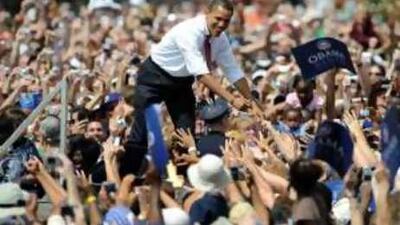DENVER, COLORADO // The lights have dimmed, the convention hall has emptied and the Democratic Party's political fete is over. What now? Fresh off his acceptance speech and with just 67 days until the November balloting, Barack Obama will hit the campaign trail today for the first time as the party's official presidential nominee and the only African-American ever to lead a major-party ticket. And he will continue to make the case that his surrogates - and, last night, he himself - made here at the Democratic National Convention: that he is the best candidate to address the country's economic woes, the war in Iraq, the threat of terror at home and abroad, global warming and what he has called the broken politics of Washington.
But some of the concerns that existed going into the four-day gathering in Denver still remain. There are signs the party has not fully healed, despite the vigorous and impassioned call for unity by Hillary Clinton, Mr Obama's one-time rival. And there are concerns whether Mr Obama's pledge to transcend traditional politics and run his campaign from the high road will leave him hamstrung to effectively counter Republican attacks, part of John Kerry's downfall four years ago.
Candidates usually get what is called a "post-convention bounce" in the polls; Democrats hope to do better on that score than Mr Kerry did in 2004, when, according to the Gallup survey, his standing remained the same after he delivered a speech that was considered weak and overly defensive (George W Bush, Kerry's rival and US president, got a two-point bounce). Mr Obama could use one, because polls show the race effectively tied and because Republicans have been swinging hard. Unwilling to cede the spotlight during convention week in Denver, as is the custom, Republicans have been hammering away at Mr Obama, in part from a "war room" set up not far from the convention hall. John McCain, Mr Obama's presumed challenger, launched a television advertisement on Wednesday, the same day Democrats focused on national security at their convention, that called Mr Obama "dangerously unprepared" for the presidency.
Meanwhile, the conservative American Issues Project began running a separate advertisement drawing a link between Mr Obama and William Ayres, a former member of a radical group that advocated violence, prompting immediate Democratic flashbacks to the Swiftboat advertisement that attacked Mr Kerry's Vietnam service and haunted him throughout the campaign. Mr Obama has said his relationship with Mr Ayres was "casual".
"We do have work to do," said Tanya Acker, a political analyst from Los Angeles and supporter of Mr Obama. "He's going to have to anticipate those attacks and respond to them." Mr Obama will try, as the rhetoric offered at the convention made clear, to portray Mr McCain as an extension of the unpopular president and a "defender of the status quo" who essentially offers a third Bush term. That line of attack rang out from the convention podium in speech after speech - from that of Bill Clinton, the former president, to Joe Biden, Mr Obama's running mate - and on the convention floor, where delegates waved red signs declaring, "McCain: More of the Same".
"It makes perfect sense that George Bush and John McCain will be together next week in the Twin Cities, because these days they're awfully hard to tell apart," Mrs Clinton said to great applause in her address, referring to Minneapolis and St Paul, the site of the Republican National Convention. While Mr Obama is employing what his campaign calls a "50 state strategy" in the general election campaign, he will largely focus on 18 battlegrounds that include some states not normally considered winnable by Democrats. Mr Bush won 14 of those 18 states in the last presidential election.
"That's really the battle," said Scott Brennan, chairman of the Democratic Party of Iowa. Mr Bush won that state narrowly in 2004, and his Democratic opponent four years earlier, Al Gore, then vice president, won it, also by a slim margin. Mr Obama and Mr Biden, along with their wives, are expected to leave Denver today for Pennsylvania, the first stop in a three-state "On the Road to Change" bus tour.
The Democratic candidates then will head to the battlegrounds of Ohio and Michigan (states Mr Obama lost to Mrs Clinton in the primaries). "It's full steam ahead," said Jaladah Aslam, 48, a Clinton delegate from Youngstown, Ohio, who is fully behind Mr Obama. Voters, she suggested, do not care so much about how many years of experience a candidate has, or whether he is young or old, they simply want to know his story.
"He's going to have to let the voters start to know him," she said of Mr Obama, who came to national politics in 2004 when he was first elected to the US Senate. Mrs Aslam, a staff representative for the American Federation of State, County and Municipal Employees, a large union, said Mr Obama must also prepare to respond to whatever Republicans throw his way. "That's what they do best: attack," she said. "Because they want to cloud the real issues."
Ms Acker, the political analyst, suggested Mrs Clinton's plea for party unity will help Mr Obama make inroads among her 18 million supporters, many of whom are middle-aged and older women. He must likewise court the white, working-class voters he had trouble with during the primaries, she said, and do so the old-fashioned way: by talking about the issues. "He may not look like a beer-chugging backslapper," Ms Acker said, "but I dare say he has an economic plan for the country that is far more sensitive and attractive to the needs of the people."
@email:eniedowski@thenational.ae

